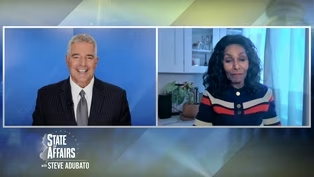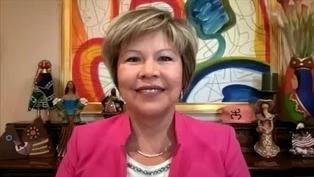State of Affairs with Steve Adubato
Rowan University Opens the State's First Veterinary School
Clip: Season 7 Episode 16 | 8m 9sVideo has Closed Captions
Rowan University Opens the State's First Veterinary School
Matthew C. Edson, DVM, Founding Dean of Shreiber School of Veterinary Medicine at Rowan University, joins Steve Adubato to discuss the opening of their new school and the challenges of retaining in-state students.
Problems playing video? | Closed Captioning Feedback
Problems playing video? | Closed Captioning Feedback
State of Affairs with Steve Adubato is a local public television program presented by NJ PBS
State of Affairs with Steve Adubato
Rowan University Opens the State's First Veterinary School
Clip: Season 7 Episode 16 | 8m 9sVideo has Closed Captions
Matthew C. Edson, DVM, Founding Dean of Shreiber School of Veterinary Medicine at Rowan University, joins Steve Adubato to discuss the opening of their new school and the challenges of retaining in-state students.
Problems playing video? | Closed Captioning Feedback
How to Watch State of Affairs with Steve Adubato
State of Affairs with Steve Adubato is available to stream on pbs.org and the free PBS App, available on iPhone, Apple TV, Android TV, Android smartphones, Amazon Fire TV, Amazon Fire Tablet, Roku, Samsung Smart TV, and Vizio.
Providing Support for PBS.org
Learn Moreabout PBS online sponsorship[INSPRATIONAL MUSIC STING] Here in New Jersey, we have an unprecedented shortage of veterinary professionals.
Right now, it's very difficult, especially for folks with large animals that aren't horses.
So goats and sheep and alpaca to even find care for those animals.
New Jersey has no school of veterinary medicine, so every student that applies has to apply out-of-state.
You know, a student goes to Kansas and stays in Kansas.
So here, if we can keep these students in-state, we can keep them here as veterinarians later.
- Allow me to introduce you to the dean, the founding dean, of The Schreiber School of Veterinary Medicine at Rowan University, Dr. Matthew Edson.
Good to see you, doctor.
- You too.
Thanks for having me.
- And also, let me disclose that Rowan is one of our higher ed partners.
Dr. Edson, this is the first veterinary school in New Jersey.
There are only 33 veterinary schools in the United States.
There's a greater need and demand for veterinary schools.
Is there not?
- There is.
With such a small number and an average of about a hundred students in a class we're not graduating enough veterinarians to meet the need here in Jersey and across the country.
So this is a major step forward for us here in the state.
- And also, let's make sure everyone understands that Rowan is not a private entity and a private institution.
It is a public research university.
Your interest in veterinary medicine, talk about that please, doctor.
- Oh, personally, I think that stems from most of us that are in this field.
This is something that I wanted to do ever since I was a child.
Had a lot of interesting pets growing up, and this is sort of the dream that I had.
And I think that's a dream a lot of folks have in the same position.
And having access to that here at home has been very important part of this project for us.
- Reading about your background, you talked to our producers.
You grew up in South Jersey?
- Burlington County, yes.
- Who's Boris?
(Dr. Edson laughs) - Boris is my dromedary camel.
- Hold on, go back and please, Georgette, our producer, Georgette, please put a picture in to prove this.
It's your camel?
- Yeah, yeah.
Us veterinarians have a tendency to accumulate some interesting pets along the way and that's probably one of the more interesting ones I accumulated.
- I'd say so.
So, other than Boris, let's pursue this a little bit more.
In terms of the veterinary school, it's a postgraduate degree program pending accreditation.
The school's schedule to open in the fall of 2025, correct?
- Yes, that's our plan.
We're in the midst of the accreditation process now, and our hope is to admit the first class in the fall of '25.
- How do we retain, you know, the whole brain drain issue.
We lose so many New Jersey students who out-of-state universities and colleges.
Talk about the need to keep New Jersey students in New Jersey, particularly those who wind up going to the veterinary school and are here to serve the animals in our state.
- Without having an in-state option everyone has to go somewhere else to go to school.
And there's a tendency sometimes for those folks to go off to school and perhaps not come back to New Jersey.
So, having an option here in-state allows us to provide in-state tuition at a reduced cost and hopefully keep them at home, get them interested in some of the practices they might rotate through as a student, and then stay here after graduation to help solve the shortage here in our state.
- Lemme do this.
Tell us about the name, The Schreiber School.
And by the way, the irony is as we're taping this program you may or may not hear it, but there's a dog barking outside of the studio.
Our team over here just heard it.
It's just, it's fortuitous.
- Perfect timing.
- It's not even our dog.
We have two, but that's okay.
The Schreiber School, the name.
- Yeah, we are very excited that Jerry Schreiber has stepped up to provide a scholarship endowment of $30 million for our program.
And in honor of that, we've named this school The Schreiber School of Veterinary Medicine of Rowan University.
We are very appreciative of his gift.
Jerry's a longtime animal advocate.
Just a wonderful, wonderful person.
And this really sets us in a great direction for this brand new program.
- In fact, I'm curious about this.
We have, you know, we're taping this at the end of June, 2023, and we often talk about the impact of COVID on professions, on people, on our psyche, on our emotional wellbeing, et cetera, et cetera, on the work environment.
What we don't talk about, and I don't think I've ever asked anyone this, is the impact of COVID, the long-term impact on animals.
- I think that's more of an indirect impact.
And during COVID vets, vets in general, offices everywhere became really, really busy.
And there's some theories that people were home and adopted more pets.
I think one of our theories is that people were home and saw their pets doing things they'd been doing for the past 10 years and now they were a problem because now they witnessed it, right?
- Exactly.
- Practices became overwhelmingly busy and that was hard, right?
We had people coming in, sitting in the parking lot, not in with their pets.
We had issues getting medical supplies, so, as rough as COVID was on the human population, there were some serious challenges here in the vet world as well.
And I think we're still recovering from that to some degree.
And the timing of the employment crisis, not having enough vets, not having enough technicians and COVID, the aftermath of that has been really hard to catch up from.
So, it has been a challenge and it's a challenge that still persists in our industry.
- Who's most likely to be in that first class at the veterinary school at Rowan?
- It's an interesting question.
We're a little bit different in our admissions process and we really want a diverse group of students from all sorts of backgrounds and all sorts of experiences.
It's really important to have enough academic success in your past that you can get through a really rigorous academic program.
But we want people from interesting backgrounds.
We want the bartenders and the people who've worked out there and dealt with humans, right?
We can teach everyone the medicine.
It's not as easy to teach 'em to get along with people.
And there's a lot of people in veterinary medicine.
So, we want a lot of different perspectives.
We're hoping to have at least 50% of our class from the state of New Jersey and then we'll fill the rest of the class from the rest of the country and internationally, and make sure we can bring as many good people together, because good humans are gonna make good doctors.
And we wanna put an emphasis on the sort of people we're bringing into this program, not just their academic performance.
- We'll be following the opening of that school.
The Schreiber School of Veterinary Medicine at Rowan University.
Dr. Matthew Edson, the founding dean.
Again, Rowan, one of our higher ed partners.
Thank you so much, Dr. Edson.
- Thank you.
Appreciate it.
- You got it.
Stay with us, we'll be right back.
- [Narrator] State of Affairs with Steve Adubato Is a production of the Caucus Educational Corporation.
Funding has been provided by The New Jersey Economic Development Authority.
Hackensack Meridian Health.
Community FoodBank of New Jersey.
Valley Bank.
Robert Wood Johnson Foundation.
Choose New Jersey.
PSC.
Veolia, And by IBEW Local 102.
Promotional support provided by The New Jersey Business & Industry Association.
And by Northjersey.com and Local IQ.
- (Narrator) Life is full of changes.
At Hackensack Meridian Medical Group, we're ready for them.
If you have a cold or chronic illness, our five star doctors can treat any ailment.
Whether you're starting recess or retiring, we're prepared with pediatric and adult specialists.
And if you just moved here, we are in your neighborhood.
You now have access to a health team thousand strong.
So no matter what or when, we're ready.
The Challenge of Breaking Into the Cannabis Industry in NJ
Video has Closed Captions
Clip: S7 Ep16 | 9m 33s | The Challenge of Breaking Into the Cannabis Industry in NJ (9m 33s)
Recruiting and Retaining More Latina Women in Politics
Video has Closed Captions
Clip: S7 Ep16 | 9m 55s | Recruiting and Retaining More Latina Women in Politics (9m 55s)
Providing Support for PBS.org
Learn Moreabout PBS online sponsorship
- News and Public Affairs

Top journalists deliver compelling original analysis of the hour's headlines.

- News and Public Affairs

FRONTLINE is investigative journalism that questions, explains and changes our world.












Support for PBS provided by:
State of Affairs with Steve Adubato is a local public television program presented by NJ PBS

